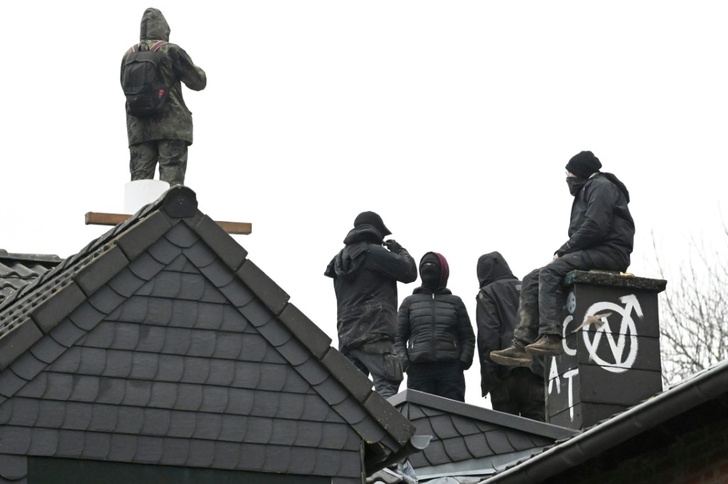German police pressed ahead on Wednesday with clearing a camp of anti-coal activists in an abandoned town which has become emblematic of the country's struggle to transition away from fossil fuels amid an energy crisis.
Once numbering as many as 2,000, around 200 anti-coal activists remain in the western German village of Luetzerath, which has been slated for demolition to enable the expansion of the neighbouring Garzweiler coal mine.
Early on Wednesday, hundreds of police tightened a perimeter around the protest camp before sunrise to prevent anyone from entering, before moving in at 8 am (0700 GMT) to the sound of alarms set off by the demonstrators, which warned that the next stage of the forced evacuation had begun.
"They took the first aid team out of the camp by force," Mara Sauer, a spokesperson for the activists, told AFP. "Only some were able to stay in hiding."
Draped in emergency blankets to stave off the cold, some of those remaining clung to trees and other built structures high up away from the police.

In sometimes surreal scenes, police sought to coax several activists tied inside concrete barrels to give up their resistance, as a violinist gave an impromptu concert from the roof of an abandoned house.
"We can't untie them, not today anyway. For that, we need special shears" one police officer told AFP.
"We have other things to do at the moment, one thing at a time," another said.
- Clearing operation may last weeks -
In Berlin, a German government spokesman acknowledged the "very emotional" debate over the fate of Luetzerath, but underlined that there is a "clear legal situation" allowing the village to be dug up for coal which "must be respected".
"This is part of our democratic understanding, it is part of an agreement and this is the law in force. The government therefore expects the law to be respected and the police are there to enforce the law," he said.
He also warned the protesters against any violence, saying that the government has "no sympathy" for such action.
Despite a tweet from police urging the protesters to "cease and desist throwing Molotov cocktails", the activists' resistance has been largely peaceful, with journalists and witnesses on the ground reporting only minor scuffles.
Erle, a student in her early 20s, told AFP she has not seen any violence from protesters or the police, many of whom seem to be the same age as her.
"Everything happened calmly, we were singing carols, then one of my comrades was picked up and I was pulled with him," she said.

A police press spokesperson said on Wednesday the operation "could last several weeks" with another demonstration planned for Saturday.
High-profile figures including Greta Thunberg and other prominent climate campaigners are expected at the demonstration, lending reinforcements to the protesters.
RWE, the energy company which owns the neighbouring mine, tweeted on Wednesday the expansion of the site was necessary due to Germany's energy crisis, triggered by Russia's invasion of Ukraine.
The "Luetzerath coal is needed... during the energy crisis and thus use less gas in electricity generation" the company wrote, saying the demolition passed an independent review.
Despite again resorting to coal to ease the pressure on gas-powered plants as the country has weaned itself off Russian energy, Germany says it is not wavering from its aim of exiting coal power in 2030.
lep-dwi/hmn/gw
© Agence France-Presse
Your content is great. However, if any of the content contained herein violates any rights of yours, including those of copyright, please contact us immediately by e-mail at media[@]kissrpr.com.
Source: Story.KISSPR.com

